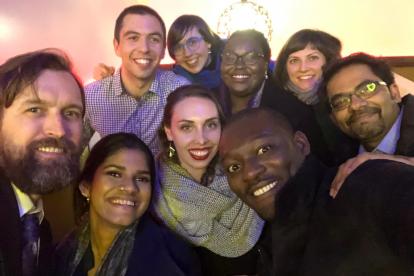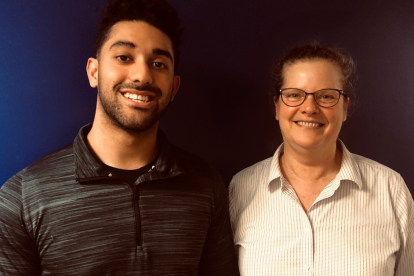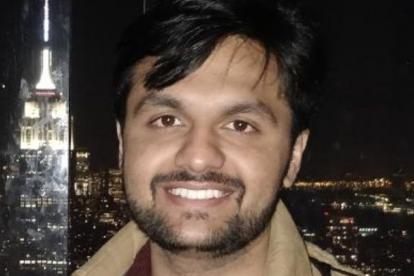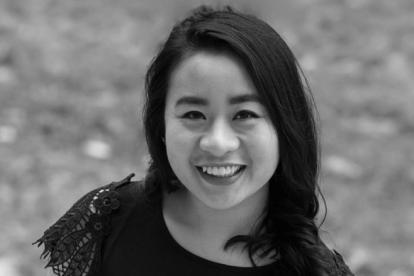Published March 19, 2021, last updated on March 24, 2021 under Voices of DGHI
Publishing research and articles is a solid career booster for global health professionals, and it’s never too early to start. Over the past few years, students at Duke Global Health Institute (DGHI) have published everything from policy papers to commentary pieces in medical journals and national media, often co-authored with their professors or other Duke researchers.
Osondu Ogbuoji, assistant research professor at DGHI and deputy director at the the institute’s Center for Policy Impact in Global Health (CPIGH), says, “At our center, we have observed that students are genuinely interested in exploring complex topical global health issues, so with guidance from faculty and the right support from our research and admin staff, they are able to develop their ideas into interesting and highly impactful pieces.”
He and colleagues also encourage students to explore publishing opportunities beyond academic journals, in non-traditional outlets such as blogs and reports.
Here, some current global health master’s students and recent DGHI alumni share a few thoughts about their writing experiences, plus some advice for other students hoping to publish soon, too.
Cordelia Kenney MS’21
Kenney recently co-authored a policy paper and Brookings Institute article on how health aid can reach the world’s poorest people. Her colleagues were faculty and staff at CPIGH, where she works as a research assistant.
She became involved with the project last spring. At the time, global health master’s students at Duke were required to take a global health policy course as part of the program, taught by Gavin Yamey.
“I absolutely had an interest in global health policy coming into the program, and that class with Gavin solidified it,” says Kenney, who had studied history as an undergraduate and then worked for four years in Washington, DC, for the Center for Global Development before coming to Duke.
“Last Spring, when COVID happened and I saw there would be a shift in my summer plans to go to Tanzania and study mental health, and a weeklong trip to Geneva to study policy was canceled, I wrote an email to Gavin and asked if he had other projects I could work on,” Kenney says.
He invited her to collaborate with Kaci Kennedy McDade, a policy associate at CPIGH. Kennedy McDade’s research focuses on donor financing for health and the impact of transitions away from aid for health.
“And that’s how the opportunity to work with them came about. Kaci gave me the freedom to run with the project — the research and writing was largely led by me and Kaci. She oversaw my work and we checked in every week. At other points, other CPIGH members provided comments on drafts. It was a very collaborative process,” says Kenney.
“I feel extremely grateful for the opportunity. Gavin, Kaci, Osondu Ogbuoji and Wenhui Mao – they were all so generous with their time, extremely approachable, and very humble. I knew having had Gavin as a professor that he was genuinely invested in students’ growth,” Kenney says of her co-authors.
Where does Kenney hope her career in global health will go from here, after graduation? “My heart is in health policy and helping to build strong health systems, and mental health – my thesis topic – will be one of the most important areas of health, especially after this pandemic.”

Cordelia Kenney M'21 (center) in...
Shantanu Srivatsa MS’20
In his second year in DGHI’s master degree program, Srivatsa published a commentary in one of the American Medical Association’s journals, the AMA Journal of Ethics. He co-authored the piece, “How Should Clinicians Integrate Mental Health into Epidemic Responses?”, with his ethics professor, Kearsley Stewart, professor of the practice of global health. Published in February 2020, their commentary was borne out of classroom discussions about the 2010 cholera epidemic in Haiti and the 2014 Ebola epidemic in Africa. Stewart’s guidance on the initial outline and structure, and later on subsequent drafts for the journal editor was invaluable, he says.
Cultivating relationships with faculty whose work you are interested in can help lead to publication, he says, adding, “Most faculty are open to working with students who they see work hard in their programs.”
Now living back in his hometown of Fresno, Calif., Srivatsa has continued working with Duke faculty. He is currently conducting sickle cell disease research for Charmaine Royal, professor of African & African American studies, biology, global health, and family medicine and community health at Duke. He had worked with her on a National Academy of Sciences report on the state of sickle cell disease in the U.S. while at Duke and that led to the research opportunity he has now. He’s also continuing previous research, working remotely with DGHI’s João Vissoci, assistant professor in the Duke School of Medicine, Department of Surgery, Division of Emergency Medicine and in the Duke Global Neurosurgery and Neurology Division.
Srivatsa, who is thinking about pursuing an MD-PhD degree, says students who feel unsure about how to reach out to a professor they’d like to work with should send an email and include details about their interests.
“Instead of a generic email, read a paper or the last few papers that they’ve published, and mention in your email a specific method or detail about it that interests you. Showing that you're interested beyond a surface level can help you make a personal connection,” Srivatsa says.

Shantanu Srivatsa MS'20 and Duke Global...
Siddhesh Zadey MS’21
In 2019, as a first-year masters in global health student at Duke, Siddhesh Zadey published an essay in The Wire called “Why India's Surgical Care Crisis Is Less Jigsaw, More Tetris.” In May 2020, he wrote about the economic benefits yet social risks of opening India’s liquor stores back up during the pandemic for Global Health Now, a Johns Hopkins Bloomberg School of Public Health website. And again, just last month, a second piece ran in Global Health Now, “Helping Doctors Reach Rural India.”
Zadey’s also published a letter to the editor in The BMJ, collaborated on an analysis in The Lancet, and he’s been quoted in Duke Today. How does one so early in his career make such a literary splash in the med/sci world? Zadey chalks it up to liking writing.
“In academia, at some level, you have to have a personal love for writing. If you don’t, maybe academia is not the place for you. I probably spend time writing at least 1000 words a day,” he says.
Like Kenney, Zadey at times has reached out to his professors for guidance.
“In December, my co-author and I had tried to get a piece published in one or two academic journals. At that time, it was a long 2,000-word article and we didn’t have success. We figured maybe it would be a good idea to send it to Gavin Yamey to get some feedback. Faculty at DGHI are super helpful if you are trying something on your own. He took a look at it and said it was good and said we should go for an online blog instead of a journal,” says Zadey.
Yamey suggested submitting it to Health Affairs and Global Health Now, where he’d had a previous article run. Since Global Health Now has more global readers, they tried it first, nudging the editor with reminder emails when they didn’t hear back after a few days. Within about a month, it was accepted and their article ran in February.
Currently, Zadey has a few other papers he hopes to see published this year, including one on the ethics of lockdown in India that grew out of from Kearsely Stewart’s global health ethics course. He and Srivatsa, along with classmate Arthi Kozhumam, also worked on a policy brief together that stemmed from a global mental health class they took last year. They’ve submitted it to the Duke Students Global Health Review.
“A lot of the things I’m getting published are coming out of classes,” Zadey says.
For all his success publishing early in his career, Zadey admits that it can still be intimidating, and inequities in the scientific publishing world can be challenging. For example, researchers can pay to have their work published in open access journals such as those in the Nature family of journals, which require authors to dish out thousands of dollars, but that leaves many graduate students living on low incomes out of the running.
Zadey adds, “A lot of big journals are interested in big people, but it’s important not to get into a zone where you feel the pressure of publishing big or too soon. That was probably one of the mistakes I made early on. What I try to do now is focus on the substance of what I have and if it’s going to be interesting to other people.”

Siddhesh Zadey MS'21 has published...
Tra Tran MS’20
Tran traces the opportunity to co-author a research article published in BMC Public Health with DGHI’s Deputy Director Shenglan Tang to a barbecue in Durham in 2019, the summer before her second year of the masters in global health program at Duke. It was a start-of-the-year picnic to welcome the new MS class.
“I had already been in class with Shenglan and I really enjoyed his teaching style. It’s very straightforward,” she says.
So, Tran says, “I approached him at the barbecue and said I had extra time this coming semester and that I would like to do more writing specifically on policy in the global south. I had done the policy in Geneva program with Gavin Yamey that summer at the South Centre, so I was interested in how the global south approaches health through policy.”
From there, things fell into place. She wrote the first draft for BMC Public Health, which compared the different pathways China and Vietnam used to achieve universal health coverage and what other countries could learn from them. A year later, after graduation, it was published. More recently, she wrote a summary of the research for Brookings and was the first author on the piece.
Tran believes being in Shenglan Tang’s class prior to asking him for the chance to collaborate was key.
“The best way to do it is to form a relationship in class. I don’t think Shenglan would have given me a chance had I not been in his class, and had he not liked me a little bit and assessed my ability to do the work. Faculty don’t want to waste time, funding and effort,” she says.
Students should look at approaching faculty about writing and research as an experience to learn, Tran adds.
“It’s ok if someone tells you no, too. Learning how to accept a ‘no’ is totally reasonable, and being very gracious about it. You’re a student and you’re practicing how to engage with your colleagues and people who you want to mentor you,” she says.
She assures first-year masters students that it gets easier over time to form relationships with faculty, and those relationships can result in publishing opportunities.
“Your first year, you’re hustling and just trying to find people whose work you’re interested in and who you want to work with as a mentor. By second year, though, you have time to reach out to more faculty who may not be your primary project faculty,” she says, noting that asking about collaborating in summer or early fall before second year is a good tactic to keep in mind.
“They usually have funding for writing and students in the fall. So, in August, reach out in person and form a relationship,” Tran says.
Tran stayed on at Duke after graduation last year and is currently the program director at The Kenan Institute for Ethics, where her work focuses on domestic minor sex trafficking and the commercial exploitation of children.

Tra Tran MS’20 co-authored a...